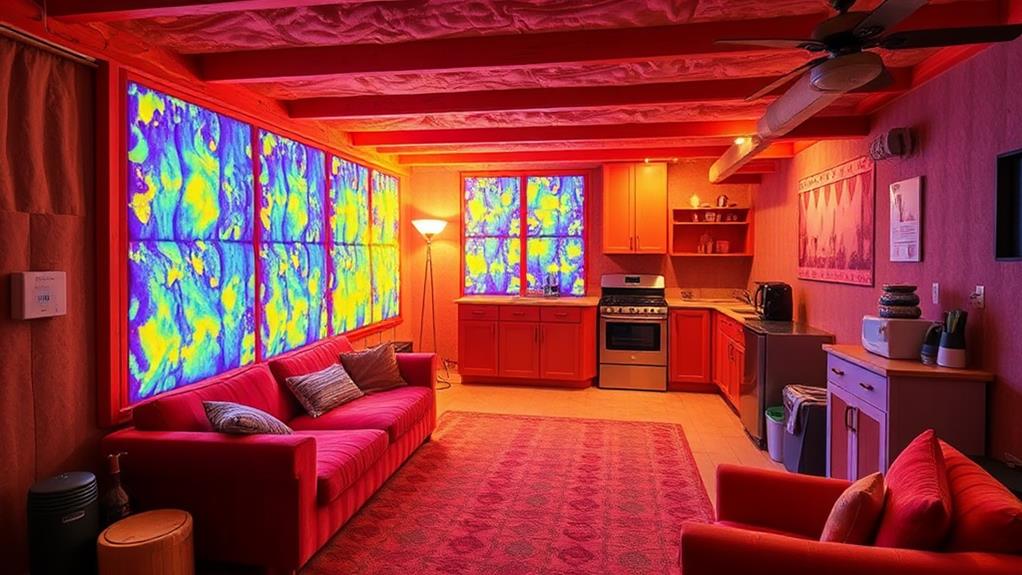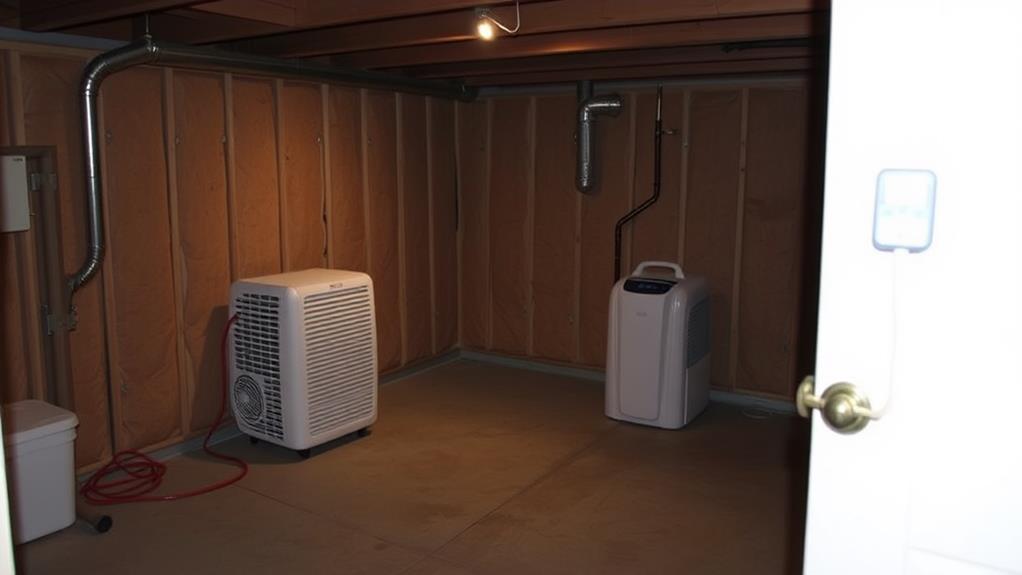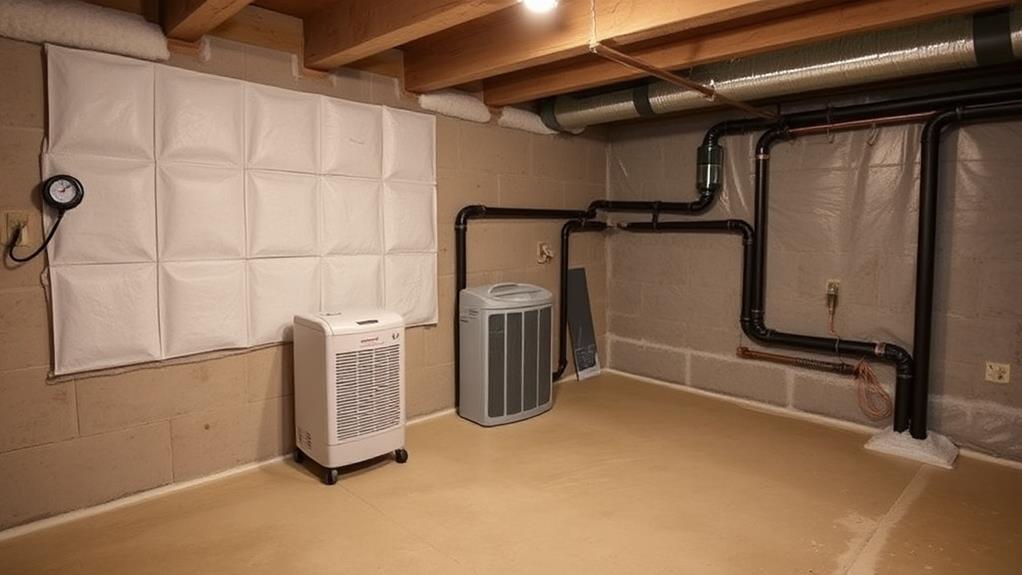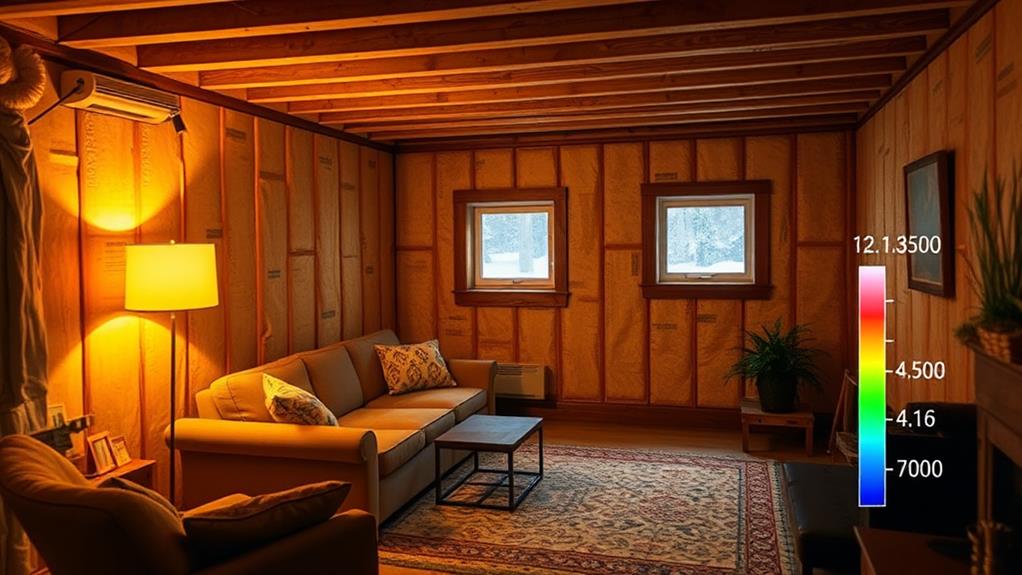Insulating your basement or crawl space offers numerous benefits for your home. You'll save energy by reducing heat loss and lowering your HVAC system's workload, leading to decreased energy bills. Your home's comfort will improve with warmer floors, fewer drafts, and more stable humidity levels. Moisture control prevents issues like mold growth and wood rot, while enhanced air quality creates a healthier living environment. You'll also increase your home's value, deter pests, and protect its structural integrity. By taking this simple step, you're not just improving your home's efficiency – you're investing in its long-term health and your family's well-being.
Energy Savings

Three key factors contribute to energy savings when you insulate your basement or crawl space. First, insulation reduces heat loss through the foundation walls and floor, keeping your home warmer in winter and cooler in summer. This means your HVAC system won't have to work as hard to maintain a comfortable temperature, leading to lower energy bills.
Second, insulation helps prevent moisture-related issues. By controlling humidity levels, you'll reduce the risk of mold growth and wood rot, which can compromise your home's structural integrity and air quality. This, in turn, reduces the need for costly repairs and improves your home's overall energy efficiency.
Lastly, insulating your basement or crawl space creates a more consistent temperature throughout your home. It eliminates cold spots and drafts, allowing for more even heating and cooling. This improved temperature regulation means you're less likely to overcompensate by cranking up the thermostat or air conditioning.
Improved Comfort
Insulating your basement or crawl space leads to improved comfort throughout your entire home. When you insulate these areas, you create a barrier that prevents cold air from seeping into your living spaces. This results in warmer floors, especially on the ground level, making it more pleasant to walk barefoot or play with children on the floor.
You'll notice a significant reduction in drafts and cold spots near basement walls and floors. This improved temperature consistency means you won't experience sudden chills when moving from one room to another. The insulation also helps maintain a more stable humidity level, reducing the likelihood of damp, musty odors wafting up from below.
In summer, insulated basements and crawl spaces stay cooler, helping to moderate the temperature of your entire home. This can make your living areas feel more comfortable without overworking your air conditioning system. Additionally, you'll experience less noise transmission from outside, creating a quieter, more peaceful indoor environment. By insulating these often-overlooked spaces, you're investing in year-round comfort and a more enjoyable living experience for you and your family.
Moisture Control

Moisture management is a critical benefit of insulating your basement or crawl space. When you properly insulate these areas, you create a barrier that helps control humidity levels and prevents condensation. This is especially important in regions with high humidity or where groundwater seepage is common.
Insulation works by maintaining a consistent temperature between your living space and the basement or crawl space. This temperature stability reduces the likelihood of warm, moist air coming into contact with cooler surfaces, which can lead to condensation and mold growth. By controlling moisture, you're not only protecting your home's structure but also improving indoor air quality.
Proper insulation, combined with a vapor barrier, can significantly reduce the amount of moisture that enters your home from the ground. This helps prevent issues like wood rot, rust on metal components, and the deterioration of stored items. You'll also notice a decrease in musty odors typically associated with damp basements or crawl spaces.
Enhanced Air Quality
Over time, insulating your basement or crawl space can lead to a significant improvement in your home's air quality. Uninsulated spaces allow outdoor pollutants, allergens, and moisture to enter your living areas, compromising the air you breathe. By properly insulating these spaces, you create a barrier that prevents these contaminants from infiltrating your home.
Insulation helps maintain a consistent temperature in your basement or crawl space, reducing the likelihood of condensation and mold growth. This is crucial for air quality, as mold spores can trigger allergies and respiratory issues. Additionally, insulation minimizes drafts, which can carry dust, pollen, and other particulates throughout your home.
You'll also notice a reduction in musty odors typically associated with damp basements or crawl spaces. These odors are often indicators of poor air quality and can be eliminated with proper insulation. Furthermore, insulation helps prevent radon gas from seeping into your living spaces, protecting you from this potentially harmful radioactive gas. By investing in insulation, you're not only improving energy efficiency but also creating a healthier living environment for you and your family.
Increased Home Value

Beyond the health benefits of improved air quality, insulating your basement or crawl space can significantly boost your home's value. Prospective buyers often view a well-insulated home as a sign of quality construction and energy efficiency. When you decide to sell, you'll likely recoup a substantial portion of your insulation investment through a higher sale price.
Insulated basements and crawl spaces contribute to lower energy bills, a strong selling point for potential buyers. They'll appreciate the long-term savings and comfort that come with a properly insulated home. Additionally, insulation helps prevent moisture-related issues, such as mold growth and structural damage, which can be major red flags during home inspections.
By insulating these areas, you're also increasing your home's livable space. A dry, warm basement can be transformed into extra living quarters, a home office, or a recreation room, adding valuable square footage to your property. This versatility makes your home more attractive to a wider range of buyers, potentially leading to faster sales and better offers.
Lastly, an insulated basement or crawl space demonstrates your commitment to home maintenance, giving buyers confidence in the overall condition of the property.
Pest Prevention
In addition to energy savings and comfort, insulating your basement or crawl space serves as an effective pest prevention measure. Properly installed insulation creates a barrier that deters common household pests from entering your living space. By sealing gaps and cracks, you'll make it harder for insects, rodents, and other unwanted critters to find their way inside.
Fiberglass and foam insulation materials are particularly effective at blocking pests. They're resistant to gnawing and don't provide an attractive nesting environment. When you insulate, pay special attention to areas around pipes, vents, and electrical outlets, as these are common entry points for pests.
Moisture control is another crucial aspect of pest prevention. Many insects thrive in damp environments, so proper insulation helps keep your basement or crawl space dry. This reduces the likelihood of attracting moisture-loving pests like termites, silverfish, and cockroaches.
Structural Protection

While pest prevention is a significant benefit, insulating your basement or crawl space also plays a key role in protecting your home's structure. By maintaining a consistent temperature and humidity level, insulation helps prevent the expansion and contraction of building materials that can lead to cracks, warping, and other structural issues.
Insulation acts as a barrier against moisture, reducing the risk of wood rot, mold growth, and rust on metal components. This protection extends to your home's foundation, helping to prevent frost heave in colder climates and minimizing the impact of soil expansion and contraction.
You'll also notice improved stability in your flooring above the basement or crawl space. Insulation helps eliminate cold spots and reduces the likelihood of sagging or creaking floors. Additionally, it can protect plumbing and HVAC systems running through these areas from extreme temperature fluctuations, potentially extending their lifespan and reducing the risk of frozen pipes.
Conclusion
You've now seen the wonderful advantages of giving your home's lower level a cozy sweater. By taking this step, you'll not only keep your wallet happier but also create a more pleasant living environment. You'll say goodbye to unwanted moisture issues and breathe easier with improved air quality. Plus, you'll boost your home's value and keep uninvited critters at bay. Don't wait – your home's foundation will thank you for this protective embrace!

